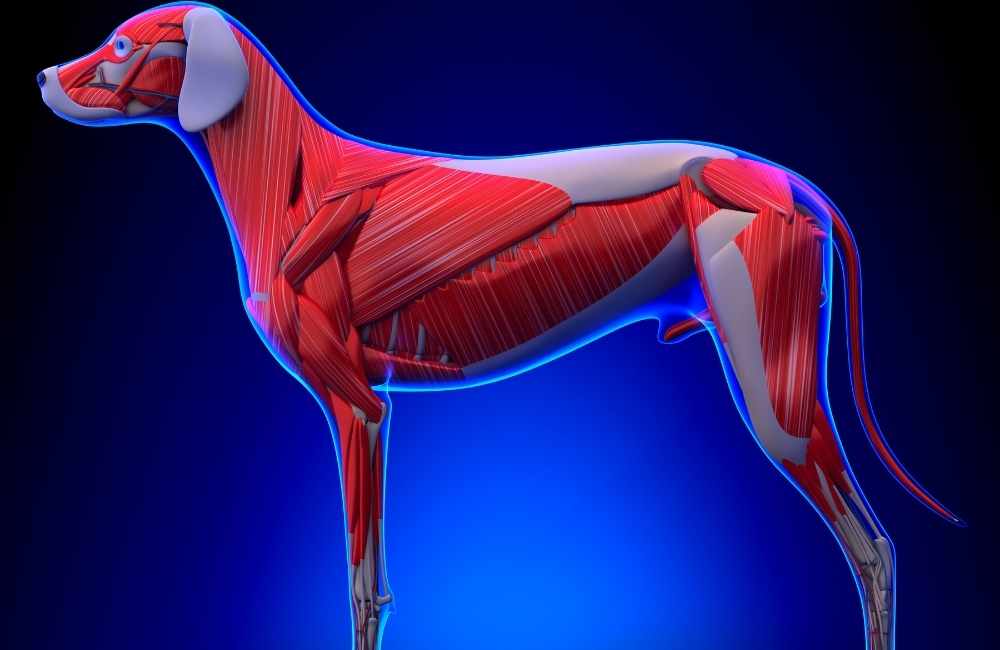So you’re thinking of neutering your beloved dog. I’m pretty sure you’ve come across dozens of myths surrounding the neutering process and its unspoken risks.
One common concern among most canine parents is the possibility of their dog losing muscle from neutering. As crazy as it may sound, there might be some truth to this particular neuter myth.
Before we go any further, though, let’s explore what neutering is, when to do it, and what your doggo stands to gain from it.
What is Neutering?
‘Neutering’ is removing an animal’s reproductive tissues. For males, neutering is referred to as castration, while in females, it’s known as ‘spaying.’ In males, it’s only the removal of testicles, while in females, it’s the ovaries and most of the uterus.
When Should You Neuter Your Dog?
It’s rather apparent, but not all dogs have the same physiological structure. Different sizes and breeds have varying ages for castration. That’s why you must consult with your dog doctor about the effects of neutering on your dog.
However, most veterinarians agree that the best time to castrate/spay your furry friend is before they hit puberty. Not only does it minimize the risk of unexpected litters, but it also offers behavioral benefits.
What are Some of the Benefits of Neutering?
Your pup stands to gain a lot from neutering. Probably one of the most recognizable upsides of having your dog neutered is the positive impact it has on their behavior.
Male dogs that haven’t gone under the knife tend to be more negative behaviorwise when compared to the females. Intact males may have higher testosterone levels, leading to a stronger desire to make babies and start fights with other dogs.
Post-op, these dogs exhibit a calmer behavior that makes them easier to handle. They roam less frequently, thus preventing severe accidents such as being hit by a car or injuring a more muscular dog. Neutering is also a good way of avoiding severe illnesses such as uterine infection (pyometra), prostatitis, and breast cancer.
In males, it lowers the chances of testicular cancer and an enlarged prostate (benign prostatic hyperplasia). Generally speaking, neutered dogs tend to have a longer, healthier lifespan.
Keep in mind that veterinarians may give male dogs a vasectomy instead of a castration, depending on whether or not you want to limit their out-of-hand sexcapades.
If you prefer a less-invasive surgical procedure that allows your dog to keep their testicles intact, there’s an option for that too. However, most vets may not support it because it doesn’t provide all the health benefits that complete castration offers.
Will Neutering Your Dog Make it Lose Muscle?
If you’re having second thoughts about neutering your canine companion, you’re not alone. It’s a shared fear among most dog owners that spaying or castrating a dog will cause their bones to grow brittle and their muscles to diminish.
Well, there’s an element of truth to this.
The hormones produced in a dog’s reproductive organs play a considerable role in bone density and muscle growth. On the other hand, the impacts of neutering on your dog’s bones and muscles aren’t as dramatic as most people believe.
For your information, your dog’s physical development has a lot to do with its diet. The foods you give your dog determine how their bones and muscles respond to the absence of the related hormones.
Facts about Neutering and Muscle Loss
Neutering Doesn’t Affect Your Dog’s Muscle Mass.
There’s no scientific evidence that links spaying or castration to muscle loss among dogs. However, there have been cases where mature male hounds castrated at a tender age began exhibiting a lower muscle mass than males of a similar age.
There are countless theories behind this unusual phenomenon, but the truth is yet to be known. It’s not abnormal for dogs to exhibit a modest reduction of muscle mass, especially after neutering in their puppy years. This occurrence is infrequent, and the impact is short-lived.
Neutering doesn’t affect your dog’s muscle mass, provided the procedure was done at a relatively younger age.
The fact that neutering does not reduce your dog’s muscle mass doesn’t mean that you should implement it on dogs with massive muscles.
Most ‘shredded’ dog breeds are bound to develop specific health issues such as joint problems regardless of their neutered state.
Neutering your dog doesn’t mean that it won’t have any physical health issues in the future. At the same time, there’s no clear evidence to prove that spaying or castration will make your dog unhealthy, frail, or weak.
The fact of the matter is that diet, environment, and genetic blends may lead to varying levels of bone mass and lean muscle. A slight reduction in body weight doesn’t often lead to changes in muscle mass.
Does Your Dog’s Breed Determine Whether or Not it Will Lose Muscle When Neutered?
A couple of breeds have been noted to lose tremendous muscle mass when they’ve been neutered. Be that as it may, take note that ALL dog breeds are bound to exhibit different effects to spaying or castration.
It’s a fact that dogs are most likely to develop serious health issues such as joint problems later on in their lives. It’s expected that they will also lose muscle when neutered, which applies regardless of their breed.
By neutering the dogs at a relatively young age, they may start to exhibit decreased muscle mass as they mature into adulthood. The reason might be because of the removal of testicles which produce hormones responsible for muscle mass. And yes, this is the case for both females and males.
Others relate the decrease in muscle mass to their uncontrollable tendency to fall prey to osteosarcoma (a bone tumor that affects muscle growth).
The cross-breeds of purebred dogs often have what’s referred to as a ‘low testosterone’ gene. These dogs develop bone and muscle issues similar to those present in several other dog breeds.
Can You Tell If Your Dog Will Lose Muscle After Being Neutered?
Unless you’re an all-seeing Jedi with the ability to peep into the future, it’s utterly impossible to tell if a dog will lose muscle after neutering.
Different dogs have their levels of muscle loss. What might be considered a considerable loss in breeds such as German Shepherds or Greyhounds might not even be detectable in other small species like Chihuahuas.
You may need to be clear of the muscle loss that you’d want your dog to achieve and cross your fingers that it will be the case post-surgery. Some dog owners have stayed with their dogs long enough after neutering to see them lose their muscle – something they weren’t prepared for.
Therefore, before taking the step of neutering, you need to decide if that’s a risk you’re willing to take or not.
Dogs That Have a Higher Risk of Muscle Loss
Like their human counterparts, dogs of all breeds have a varying degree of fat and, for others, muscle tone.
I wouldn’t necessarily consider fat density a reliable indicator of muscle density. To put this into perspective, a purebred dog with heavy, natural muscles may retain its muscle mass despite being castrated.
If you want to get rid of your dog’s uterus or testicles, it’s fair to say that you need to be prepared for its impacts on your dog’s physical development.
What are the Side Effects of Neutering a Dog?
As a dog owner, you’re encouraged to neuter your dog when it’s at least six months. However, with more and more studies coming up, that one-size-fits-all approach may not be worth considering. Neutering a dog at any age may bring about long-term, surgical, and physiological side effects.
Long-Term Effects
A few years back, incidents of surgical complications were recognized as potential risks of spaying or castration. Recent studies have further shown an abnormal growth pattern in terms of long-term health risks concerning neutering.
In these studies, neutered dogs developed a higher risk of vaccine reactions, cognitive impairment, orthopedic disorders, obesity, hypothyroidism, and different types of cancers. However, the research did not find these long-term health risks in dogs that retained their reproductive organs.
In a few instances, the possibility of dogs developing long-term health risks relied on the time of surgery and their age.
Surgical Effects
Spaying or castration are often regarded as ‘routine’ surgeries, but they come with their surgical risks all the same.
Some dog breeds may react negatively to surgery and post-surgery medication. Things might get worse, especially if your little furry one has a pre-existing condition.
Before taking the plunge, book an appointment with your vet to determine whether you need to take any special precautions.
If you still keep in touch with your dog breeder, hit them up to confirm if your furry friend has any genetic condition that may hinder surgery.
Physiological Effects
Because neutering gets rid of testosterone from your pet’s system, there might be a slight decrease in sex-related tendencies such as roaming and marking. Although you might think that neutering is to curb hostility among dogs, the results vary from one study to another.
One study might show a decline in aggressiveness, while another might show little to no effect. Neutered dogs tend to exhibit unusual behaviors such as stealing food, begging, or barking.
My Dog’s Been Neutered. How Long Till it Gets Back to Normal?
A castration/spay recovery period varies based on your dog’s age and size. Here are a couple of points to keep in mind:
- Neutering is a complex abdominal procedure that might take a while before your dog fully recovers from its effects. However, some vets report that males tend to recover quicker than their female counterparts.
- On most occasions, dogs over six years may take up to seven days to heal from a successful neuter surgery.
- Generally speaking, older and larger dogs may experience a relatively longer healing time. For this lot, it often takes 2-3 days before they get back to normal. It could even be longer, depending on how old your dog is.
- Dogs older than three years usually take one or two days to recover fully.
- Smaller dogs tend to recover faster. They have smaller incisions, plus the affected anatomy isn’t all that great. Not only do they experience minor discomfort, but they have a lower chance of bleeding post-surgery.
Is Neutering Expensive?
It could be, depending on your area of residence, as well as your dog’s breed. On average, the cost of neutering ranges between 50 and 250 bucks. To determine the exact price, have a sit-down with your vet. They will help you analyze all the options and give you their professional recommendation.
Keep in mind also that a single consultation might cost you big time. On the other hand, if you’re more interested in the health and well-being of your loveable hound, you’ll see it as nothing more than a worthy investment. Spending big now will save you from more significant expenditures in the future.
What You Need to Look Out For Post-Surgery
If your dog seems to be in severe pain a few days after surgery, check with your vet for pain medication or medical advice. If it often licks the stitches on the incision, you can prevent this by using an Elizabethan collar.
Your dog might feel ridiculous in one of these, but it’s for their excellence. Keep an eye on them to prevent them from bonking into tables and doorways as they move from place to place.
Suppose you notice any abnormal changes or symptoms in your dog. It’s normal for your dog not to go back to its usual self after surgery. What’s not normal is if they maintain those behaviors much much later.


